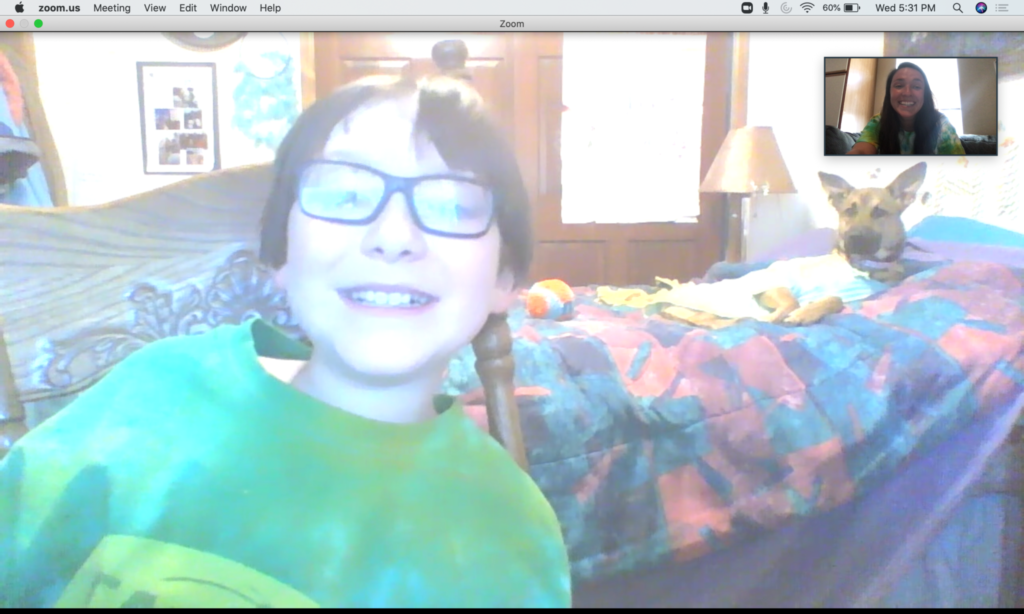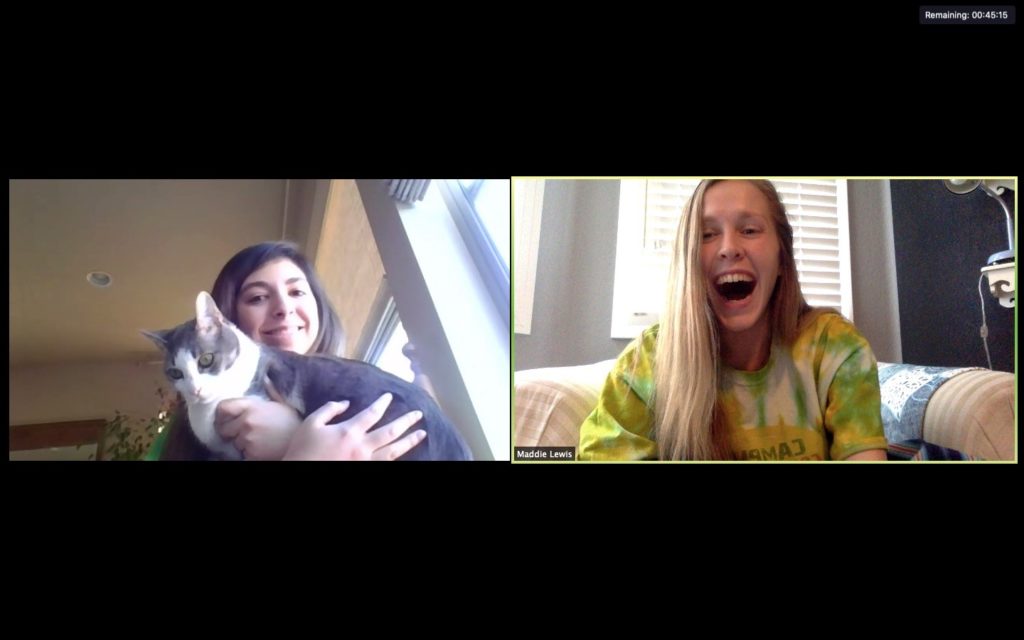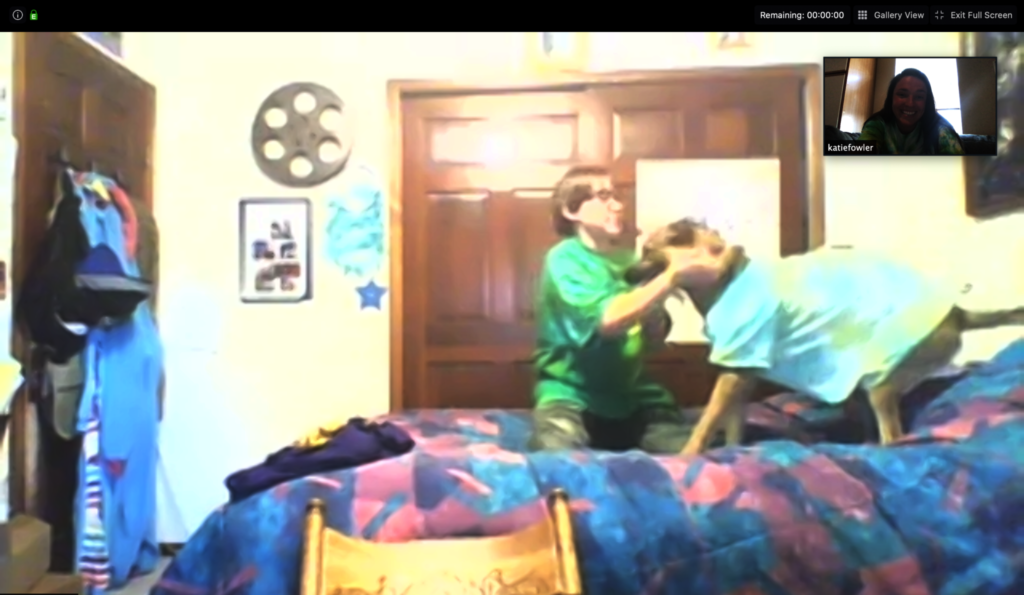
Jasper, a Campus Connections youth participant, and his dog meet with his mentor on Zoom.
On weekday evenings in the spring, the first floor of the Gifford Building on the Colorado State University campus is usually a lively atmosphere. Laughter rings through halls as Campus Connections student mentors and mentees enjoy dinner together and play social games like makeshift bowling or trivia.
But the halls were empty and quiet the last couple of months, as the activity moved online when CSU shifted its operations to virtual environments due to the COVID-19 pandemic.
Local youth who are experiencing adversity are in need of support now more than ever. To confront COVID-19, Campus Connections, a program in the Department of Human Development and Family Studies that provides these youth with on-campus, after-school programming that includes mentoring, mental health therapy services, and learning experiences for CSU students, changed how it operates.
A trying time
This unprecedented pandemic has been a trying time for many families. Parents and guardians have struggled to keep youth engaged, and those who are essential workers have struggled to find child care or programming. With no school, youth of all ages transitioned from routine scheduling and socializing to isolation.
Campus Connections student leaders and the leadership team helped transition their program online to allow mentors and mentees to still be in communication with each other, to remedy the isolation.
“In difficult times it’s important to have support, especially for the youth,” said Nicole Reichelderfer, CSU alumna and volunteer lead mentor coach.
Parents and guardians of youth have mentioned to Reichelderfer how grateful they are that their youth were still able to be involved with their mentor and the therapists.
How it works
The entire program, consisting of almost 120 undergraduate students, eight Marriage and Family Therapy graduate students, and the enrolled youth, participated in Campus Connections remotely.
The program continued to operate four nights a week online. CSU students and youth met on Zoom on the same day and time they would have if they were coming to the program on campus.
Like the on-campus program, participants were grouped into mentor families online. Youth mentees and CSU student mentors spend the first hour online with four mentor-mentee pairs that make up their mentor families.
During this hour they play games, share their highs and lows, and connect with each other.
After the hour with their mentor families, youth meet with their mentors for one-on-one sessions where they receive homework help, tutoring, and support.
If needed, youth can meet with a mental health therapist from the CSU Marriage and Family Therapy graduate program.
‘Incredibly creative’
“The transition from on-campus to online has had little change in the amount of fun the youth and mentors can have with group activities,” said Reichelderfer. “Mentor coaches have been incredibly creative in brainstorming activities.”
Jeopardy, origami, Kahoot competitions, dance battles, yoga, and makeshift scavenger hunts are just some of the activities that mentors have done remotely with their mentees.
Some aspects of the program, like the 30-minute walk on campus and dinner, cannot be replicated online.
Being flexible with everyone has been the biggest lesson Campus Connections has learned while operating remotely. The program is known for its flexibility on campus, but providing online programming has required a different kind of flexibility, because spending two hours on a video chat is too long for some youth.
“A big lesson learned by many of us is that we are resilient and flexible when it comes to our program,” said lead mentor coach Maddie Lewis, a human development and family studies major who believes the passion for helping youth shone through every night they did Campus Connections online. “Just because some things are shut down, we don’t give up on our kids.”
Connecting online
Juliana and Maddie

Throughout the stay-at-home order, Juliana’s home was crowded. Family members moved back in, and her days of being an only child were gone. With all of the life changes, Campus Connections has been there to support her.
Juliana was a senior at Fossil Ridge High School this spring, and this was her third time participating in Campus Connections. This time around with Campus Connections online, she felt pressure to look good on camera but still had fun with her mentor, Maddie Lewis, a human development and family studies senior.
“I think our personalities clicked so well, and we were able to adapt well to being online,” said Juliana. “My mentor family was also great, and they were so fun to be around. I’m generally pretty shy in big groups that I don’t know that well, but I felt comfortable with them.”
Discussion topics
Juliana and Lewis usually talked about how the week went, family, and school. Juliana has even shown her cat, Charlie, to Lewis.
“I always felt better after meeting Maddie,” said Juliana. “Her energy is contagious even through the internet.”
Lewis believes Juliana has benefited from the online environment because she was in the comfort of her own home.
Campus Connections provided Juliana’s mother with a place where she could feel safe leaving her child happy, because in the past Juliana was in a precarious position emotionally.
“Having that connection, even online, has been awesome,” said Juliana’s mother, Wendy Webb. “She loves playing Jeopardy with her family group, and I can hear her talking to her mentor in a very animated voice during their one-on-one time.”
Webb can see the positive outcomes of continuing Campus Connections. Her daughter has been able to finish school without withdrawing.
Jasper and Katie

Wendy Bonifazi enrolled her grandson, Jasper, 11, in the program not because of problem behaviors but because of the benefits of participation.
When Jasper had on-campus sessions, Jasper came home enthused about his activities that day. He felt comfortable on campus and viewed college as a fun and exciting place to be in his future.
This spring he talked more about the interpersonal aspects of online visits, and how glad he was to see his mentor, Katie Fowler, and his mentor family.
Campus Connections is one of the few activities that continued in Jasper’s life despite the social distancing restrictions.
“I know when Jasper finishes a session, he will be super excited about whatever happened and tell me all about it,” said Bonifazi. “It’s good to know it will always be a positive experience.”
Focused, personal attention
Bonifazi explained that tweens and teens can get lost in the crowd at school and some group activities, but not at Campus Connections. The program’s mentors give mentees the focused, personal attention that most people appreciate.
“They provide quantity time as well as quality time,” said Bonifazi. “They can relate to the kids in a way that’s truly a mentor relationship, while being young enough to share cultural references as well as interests.”
Fowler, a human development and family studies senior, is thankful that she and Jasper were able to stay in contact for the remainder of the semester. They were able to engage in activities and complete his schoolwork.
“We were also able to to show each other our items that were special to us, making it more personal and fun,” said Fowler.
Jasper frequently dressed his dog, Zoe, in a tie-dye Campus Connections shirt to meet Katie.
“I dressed her in a shirt because it’s cute,” said Jasper. “The question, really, is why not? Campus Connections is awesome, and I think everyone should be able to go, including man’s best friend. She got to go online.”
Benefits of delivering an online program
Although the on-campus after-school program has been a positive aid for youth, some problems families face are scheduling conflicts and transportation problems. Guardians who work may not be able to have their youth participate in a program if it conflicts with their work schedule. Others meet the criteria for being at poverty-level income, which makes transportation to and from campus difficult.
Offering Campus Connections online ensured that youth were able to participate wherever they were and offered families the ability for their youth to participate in the program regardless of what real-life challenges occur.
Jon Worthington, lead mentor coach and a natural resources tourism major, has seen positive aspects of delivering the program online that wouldn’t normally be seen on campus.
Youth and mentors have been able to share things about their home life that they wouldn’t be able to do on campus, like show pets, decorations, crafts, music, and toys.
“In many ways, the fact that we made this work online and all the mentors make a point of showing up every week has strengthened the pair relationships, because it shows we won’t give up on these youth, and we want to make sure we are always a resource for them, no matter what,” said Worthington.
Assessing the impact
The award-winning program is continuing to assess its impact on both youth and student mentors.
Campus Connections is evaluating its influence on youth outcomes, including emotional well-being, substance use, and engagement in risk-taking behaviors. The program is also evaluating if participating in Campus Connections as a mentor improves mental and emotional health.
“When there is enough love and passion for a program, you can figure out how to make it work in a real meaningful way, no matter what may happen to get in the way. Even if it’s some surreal pandemic,” said Worthington.
Help support Campus Connections
Private support and philanthropic investments are critical to the ongoing success of Campus Connections. A gift to the program will support meaningful relationships and support for youth participants and the families, and engage CSU students in the life of the community.
Make a gift to Campus Connections.
Campus Connections is part of the Department of Human Development and Family Studies in CSU’s College of Health and Human Sciences.